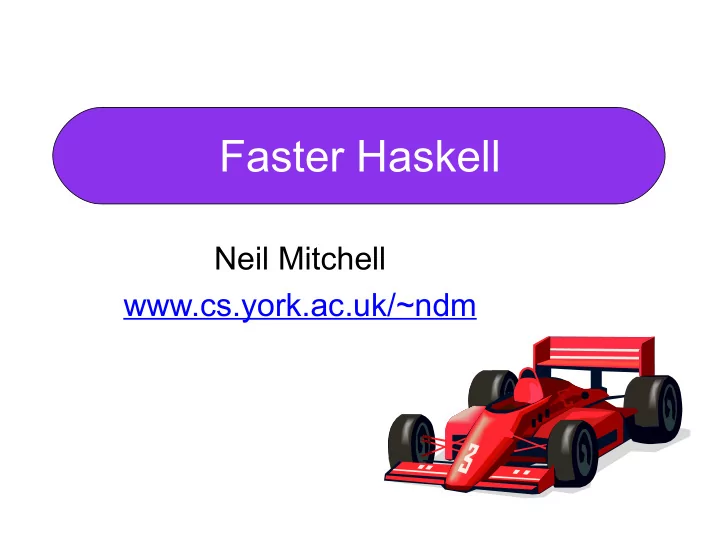

Faster Haskell Neil Mitchell www.cs.york.ac.uk/~ndm
The Goal • Make Haskell “faster” – Reduce the runtime – But keep high-level declarative style • Full automatic - no “special functions” – Different from foldr/build, steam/unstream • Whole program optimisation – But fast (developed in Hugs!)
Word Counting • In Haskell main = print . length . words =<< getContents • Very high level • A nice “specification” of the problem Note: getContents reimplemented in terms of getchar
And in C int main() { int i = 0, c, last_space = 1; while ((c = getchar()) != EOF) { int this_space = isspace(c); if (last_space && !this_space) i++; last_space = this_space; } printf("%i\n", i); return 0; About 3 times faster } than Haskell
Why is Haskell slower? • Intermediate lists! (and other things) – GHC goes through 4Gb of memory – O(n) – C requires ~13Kb – O(1) • length . words =<< getContents – getContents produces a list – words consumes a list, produces a list of lists – length consumes the outer list
Removing the lists • GHC already has foldr/build fusion – map f (map g x) == map (f . g) x • But getContents is trapped under IO – Much harder to fuse automatically – Don’t want to rewrite everything as foldr – Easy to go wrong (take function in GHC 6.6)
Supero: My Optimiser • Fully automatic – No annotations, special functions • Evaluate the program at compile time – Start at main, and execute • Stop when you reach a primitive – The primitive is in the optimised program
With wordcount main r (print . length . words =<< getContents) r (getContents >>= print . length . Words) r case getContents r of (# s, r #) -> … getChar >>= if c == 0 then return [] else … case getChar r of … • Have reached a case on a primitive
The new program main r = case getChar r of (# c, r #) -> main2 c r • Create main2, for the alternative • Continue optimisation on the branches of the case, main2 • The evaluation mainly does inlining – Also case/case, case/ctor, let movement
Tying in the knot • Each name in the new program corresponds to an expression in the old – main = print . length . words =<< getContents – main2 = the case alternative • If you reach the same expression, use the same name – makes recursive call
Summing a list sum x = case x of [] -> 0 (x:xs) -> x + sum xs range i n = case i > n of True -> [] False -> i : range (i+1) n main n = sum (range 0 n)
Evaluate main n sum (range 0 n) main n = main2 0 n where main2 i n = sum (range i n) case range i n of {[] -> 0; x:xs -> x + sum xs} case (case i > n of {True -> []; False -> …}) of … case i > n of {True -> 0 ;False -> i + sum (range (i+1) n)} tie back : main2 (i+1) n
The Result main n = main2 i n main2 i n = if i > n then 0 else i + main2 (i+1) n • Lists have gone entirely • Everything is now strict • Using sum as foldl or foldl’ would have given accumulator version
Ensuring Termination • To make the optimisation terminate – Need to “hide” some information – Anything which is an accumulator – i.e. foldl’s 2 nd argument • Lots of possible termination criteria – Want to give good optimisation – But not blow up the size of the code
Termination Problems • One theme – bound recursion depth • Problem 1: – Some optimisations require ~5 recursive inlinings – 5 recursive inlinings blows up code a lot • Problem 2: – Repeated application can square any bound – Bound of 5 can become a bound of 25!
Back to word counting • What if we use Supero on the Haskell? – Compile using yhc, to Yhc.Core – Optimise, using Supero – Write out Haskell, compile with GHC • GHC provides: – Strictness/unboxing – Native code generator
Problem 1: isSpace • On GHC, isSpace is too slow (bug 1473) – C's isspace: 0.375 – C's iswspace: 0.400 – Char.isSpace: 0.672 • For this test, I use the FFI SOLVED!
Problem 2: words words :: String -> [String] words s = case dropWhile isSpace s of "" -> [] s' -> w : words s'' where (w, s'') = break isSpace s' •Does two extra isSpace tests per word SOLVED! •Better version in Yhc
Other Problems • Wrong strictness information (bug 1592) – IO functions do not always play nice • Badly positioned heap checks (bug 1498) – Tight recursive loop, where all time is spent – Allocates only on base case (once) – Checks for heap space every time • Unnecessary stack checks Pending • Probably ~15% slowdown
Performance • Now Supero+GHC is 10% faster than C! – Somewhat unexpected… – Can anyone guess why? while ((c = getchar()) != EOF) int this_space = isspace(c); if (last_space && !this_space) i++; last_space = this_space;
The Inner Loop space/not C Haskell not/space • Haskell encodes space/not in the program counter! • Hard to express in C
The “wc” benchmark 25 20 15 C Supero 10 GHC 5 0 charcount linecount wordcount
Haskell Benchmarks • Working towards the nofib/nobench suite – Termination vs optimisation problem – Massively more complex – Much larger volumes of code • Particular issues – The read function – Invoking a Haskell lexer to read an Int! – List comprehensions (as desugared by Yhc)
Conclusions • Still lots of work to do before concluding! – Nobench is a priority • Haskell can be both beautiful and fast Thanks to : Simon Peyton Jones, Simon Marlow, Tim Chevalier for low-level GHC help
Recommend
More recommend